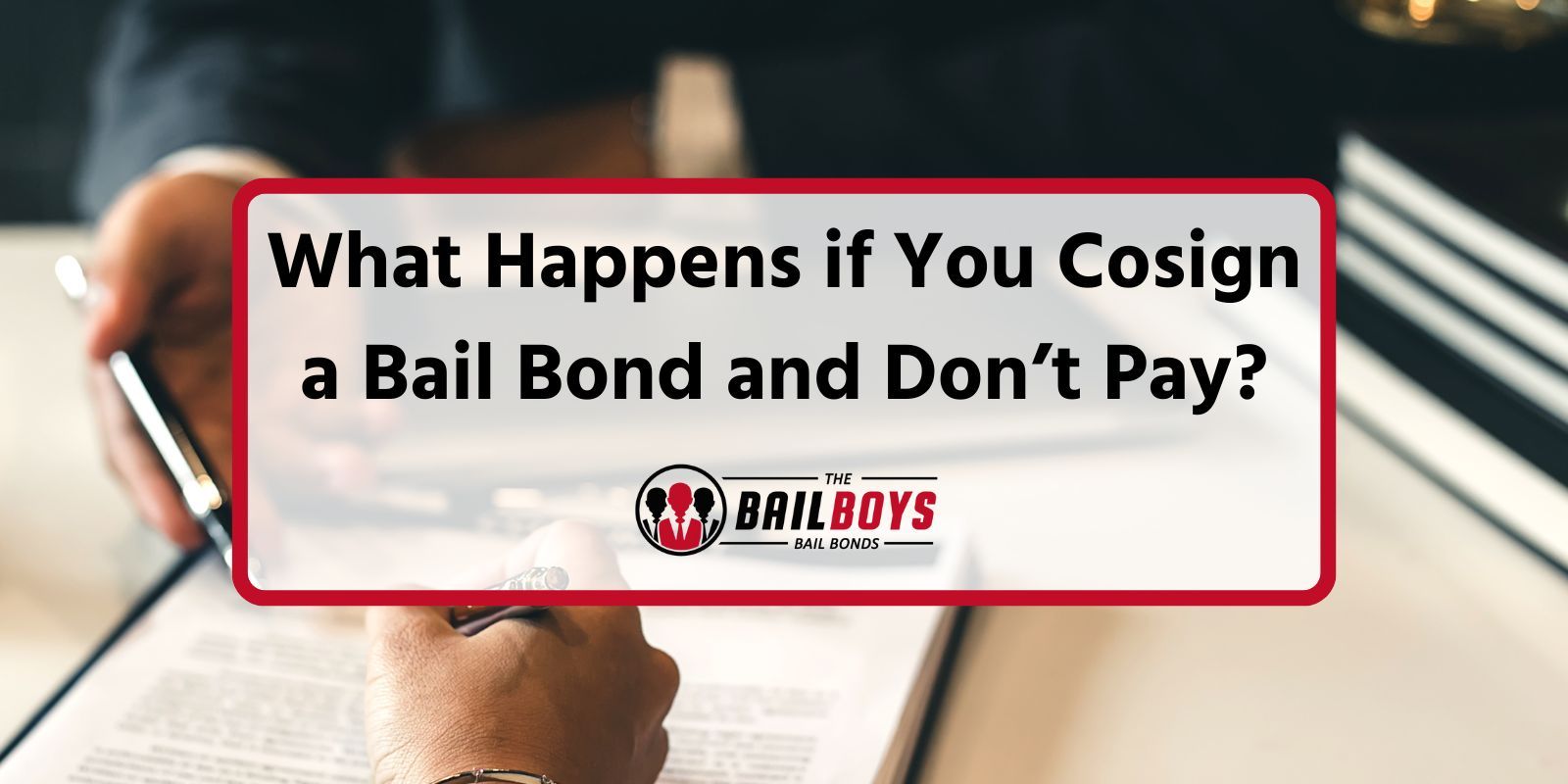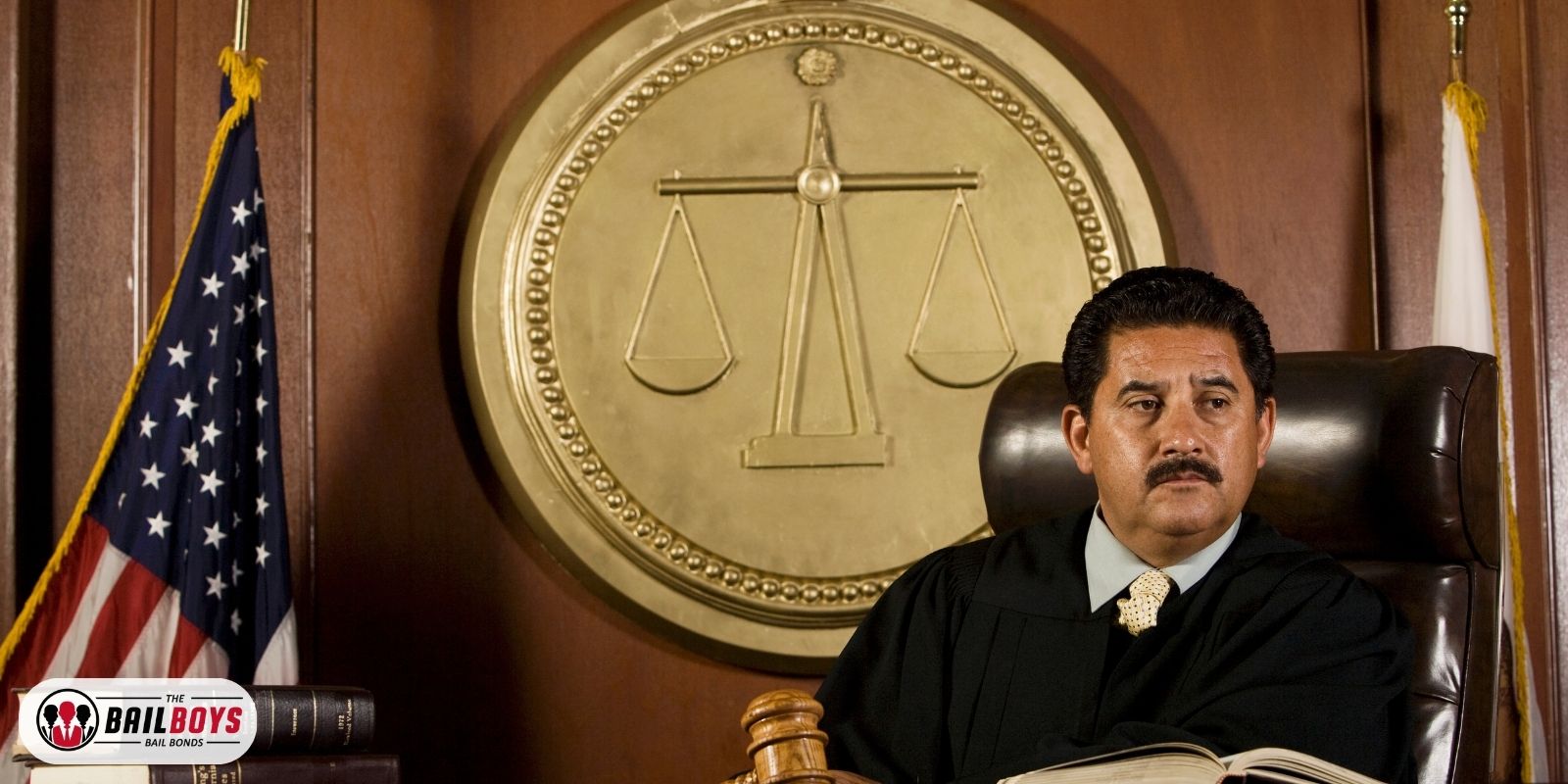
What Happens If You Cosign a Bail Bond and Don’t Pay?
Cosigning a bail bond for an accused person is a serious legal responsibility that requires careful consideration.
In this article, we will provide the information you need to cosign a bail bond. We will explain how it works and the potential consequences of cosigning a bail bond and failing to make the payments.
Understanding Bail Bonds
When an individual is charged with an offense they are arraigned in court for a bail hearing. During the bail hearing, the judge decides whether or not to grant the individual bail and how much the bail amount should be.

Once the bail amount is set, if the individual cannot afford the bail amount, they may seek help from a bail agent.
Bail agents offer defendants who cannot afford the full bail amount an alternative. The alternative is known as a Bail Bond. Bail Bonds are financial agreements between the court and the bail bondsman.
In the agreement, the bail bond company is required to pay the full bail amount should the defendant forfeit court or violate their release conditions. The bail agent provides these services at a fee typically 10% of the bail amount.
Most bail bond companies require the defendant to provide a cosigner in the bail bond agreement. The cosigner acts as a guarantee of the payment of the full bail amount should the defendant forfeit court or violate their release conditions. The cosigner is also required to provide collateral to secure the defendant’s release.
The Role of a Cosigner in Bail Bonds
A cosigner is someone who agrees to take on the responsibility of paying the bail amount if the defendant doesn’t appear in court as per the bail bond agreement.

Other responsibilities of a cosigner in the bail bond agreement include:
Ensuring that the defendant attends all court hearings and follows all conditions for their release
Sometimes a cosigner may be responsible for paying the fee for the bail agents and their services in securing the bond.
The Consequences of Not Paying the Bail Bond
Initial Repercussions
When a cosigner fails to pay the bail bond one of the initial consequences is that they will be contacted by the bail bond agent to recover the bail amount.
If they don’t comply they will receive notifications and warnings about foreclosure on any collateral provided.
In cases where there’s no response from the cosigner despite these notifications and warnings, it’s possible for the bail bond agency or company to place a bail bond lien on the collateral to cover the bail amount.
Legal Implications

As a cosigner, it is advisable to fulfill your obligation by paying the bail amount, it’s important to know the legal implications if the defendant doesn’t show up in court.
The bail bond company has the choice to file a debt collection lawsuit against the cosigner in order to collect the bail amount as a debt. If the court rules in favor of the bail bond company it becomes a duty for the cosigner to repay that debt.
If there is collateral involved and the court rules in favor of the bail bond company, they will proceed with issuing a foreclosure on the property. This process is often called wage garnishment.
If the unpaid amount of bail is reported to credit agencies it could potentially have an impact, on the credit score of the cosigner. This may affect their ability to secure loans or obtain credit in the future.
Personal and emotional consequences
When a defendant fails to appear for court hearings or comply with their release conditions it can strain their relationship with their cosigner.
The cosigner takes on both legal responsibilities if the defendant fails to attend court proceedings. Failing to pay off the bail bond can have both financial implications for the cosigner. Dealing with these consequences might be overwhelming for them emotionally and mentally.
When a defendant fails to appear in court

When a defendant doesn’t show up in court it is commonly referred to as “jumping bail” or “skipping bail.” There can be consequences resulting from forfeiting their bail.
Warrant Issuance:
In California not appearing in court is considered an offense that prompts the court to issue an arrest warrant, against the defendant and file charges.
Bounty Hunters:
In situations where locating the defendant becomes challenging the bail bond company may hire bounty hunters to track down and apprehend the accused individual.
If the defendant fails to show up in court or violates the conditions of their release the court will declare that they have forfeited the money paid for their bail.
The defendant’s failure to attend a scheduled court date can have consequences, on the outcome of their current trial.
As a cosigner, it becomes your responsibility to step in and fulfill the obligations on behalf of the defendant if they cannot be found.
Tips for Avoiding Negative Consequences If You Cosign A Bail Bond And Don’t Pay
When deciding whether to cosign a bail bond it is important to prioritize your protection. Here are some suggestions for minimizing outcomes if you cosign a bail bond and don’t pay;

Know Your Rights as a Cosigner:
As a cosigner, you have the choice to decline cosigning a bail bond. If you suspect that the defendant may not show up for their court hearings you have the right to withdraw your name from the bail bond agreement. In some situations, it is crucial to get in touch with either the bail agent or the court and cancel the bond agreement.
Establish Communication and Set Expectations with the Defendant: Before agreeing to cosign a bail bond it is essential to have conversations with the defendant, about your expectations. Make sure they fully comprehend what behaviors or actions you will not tolerate.
It’s also important to discuss what might happen if someone doesn’t show up in court and how to resolve any problems that arise.
Remember to keep a record of all your transactions and communications when entering into a bail bond agreement: It is highly recommended to have documentation, for everything during and after the agreement. These records will be extremely valuable if you ever need to cancel or revoke the bail bond agreement.
Stay well informed about the court dates for your case and make sure both you and the defendant are present as required: It’s crucial to ensure that the defendant attends all scheduled court hearings.
Options For The Cosigner To Reduce Consequences If They Cosign A Bail Bond And Don’t Pay
To minimize both financial and legal implications when the defendant fails to appear in court, cosigners have several available options.
One effective approach is to maintain lines of communication with the bail bond company. This will prove beneficial once you realize that the defendant is not complying. Staying in touch also allows you to negotiate with the bail bonds company or bond agency if necessary.
Throughout the bail bond agreement, it is advisable to seek assistance, from an attorney who can guide you through the process and offer advice on protecting your interests.
If you have any concerns, about whether the defendant will show up in court it’s important for you as the cosigner to consider canceling or revoking the bail bond agreement. This will help protect yourself from any consequences.
Conclusion
Before taking on the role of a cosigner it’s crucial to understand the emotional and financial responsibilities that come with it.
The primary responsibility of a cosigner in a bail bond agreement is to ensure that the bail amount will be paid if the defendant fails to appear in court.
Cosigners can minimize negative outcomes in bail bond agreements by knowing their rights, maintaining communication with defendants during the trial period, keeping thorough records throughout the process, and staying updated on court dates.
In conclusion, cosigning a bail bond requires an understanding of the risks and responsibilities involved. It’s also important to take measures to mitigate these risks and protect your interests.
At The Bail Boys, we prioritize both defendants and cosigners well being. We are here to support you throughout the process of obtaining bail bonds and provide guidance on how to secure your release.
Contact us if you cosign a bail bond and don’t pay!


